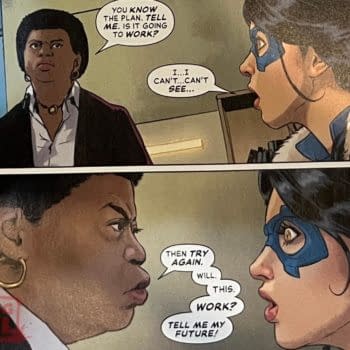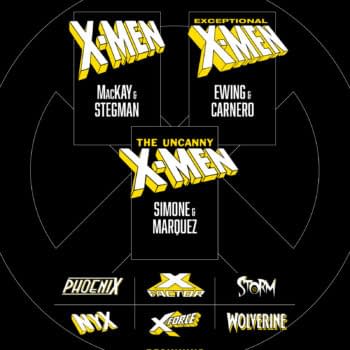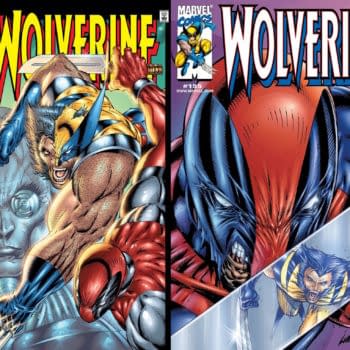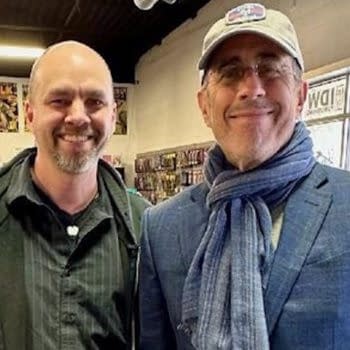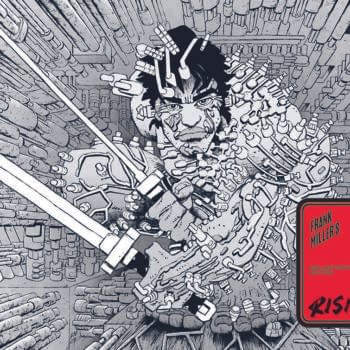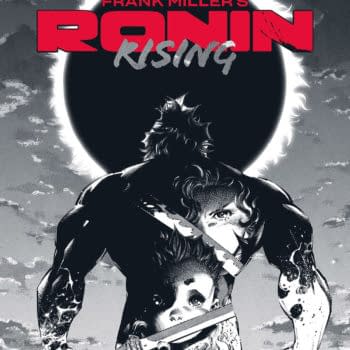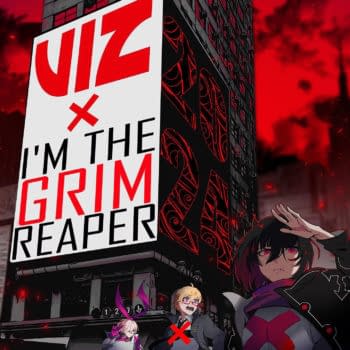Posted in: Comics, Recent Updates | Tagged: black, Comics, racism
Understanding Ethnocrunching – How Racism Works In The Comic Industry

Part I: Business as Usual.
A few weeks back, Rich Johnston published an article by Tim Hanley examining the employment numbers of White women, women of color and non-White men at Marvel Entertainment and DC Entertainment. The findings were awful but not unexpected as the Big Two have long been dominated by a culture of nepotism that routinely excludes women and non-White men, particularly Black/African-American men.
Clearly, breaking into Marvel or DC is insanely difficult and few people of any background manage to get close; but the fact that there are less than 3.0% of Blacks credited on all Marvel and DC titles as of June 2012 illustrates a serious problem that requires greater exploration. I'm not the first one to discuss this as Christopher Priest, Reginald Hudlin and Dwayne McDuffie have shared their valuable experiences as Black men working in the mainstream comic book industry. Their experiences haven't always been pleasurable and now, in 2012, things don't seem to have gotten better.
Before I go further, we must understand that American race relations are very complicated and cannot be fully explained or understood through the microcosm of superhero comics. Any anonymous internet discussion of racism (in comics and in general) usually morphs into a virtual pissing match of accusation, denial, debasement, personal anecdotes and a lack of common decency. Everything becomes personalized, people make speeches and few walk away with increased clarity on the issues of race and prejudice. In the U.S., it becomes a situation where some White people feel personally indicted as a racist and the burden rests on Black people to 1) prove racism still exists and impacts all of us, 2) explain the difference between a White person living their daily lives vs. the institutionalized system of racism, and 3) defend yourself against claims of "reverse" racism as the very mention of the issue means that you hate White people. Almost every online discussion of race boils down to these three arguments before it's all said and done. And ultimately, nothing changes because some folks refuse to separate the system from their personal identity.
Let me give you an example, during my undergraduate years, I took a few classes dealing with feminism and gender studies. I never once considered myself, a Black male, as a participant in sexism and patriarchy. I always thought of myself as being "more" enlightened than my male brethren on issues of equal rights for women. The revelation that I had sexist ideas drilled into my psyche was unsettling. I hated feeling like a bad guy. First, I blamed my professors, labeling them as "feminazis." Then I gave endless examples from my personal life about how fairly I treated women compared to most men. For months, I carried a deep, burning hatred of feminism and those who preached the tenets of gender politics because I believed that the problem wasn't "that bad" and it would go away if they would just shut up. Eventually, after many long years of self-reflection, I realized that it was not me – Brandon Easton – they were criticizing; it was the system of sexism itself and showing me how I was an unwilling participant in patriarchy didn't mean I was an evil person. It just meant I needed to grow as a human being.
One more thing, I'm not an advocate of affirmative action in comics. Either you have talent or you don't. The problem is that those with talent aren't getting the same opportunity to pitch ideas as others. The numbers don't lie. The question is why are the numbers so low?
I should delineate between comic book illustrators and comic book writers. To break in these days, a writer must distinguish themselves in Hollywood and/or the independent comics scene and/or be a creator of something in popular entertainment. The few Black writers who've been employed by Marvel or DC in the last few years have fit the bill (Eric Wallace, Felicia Henderson, Eric Jerome Dickey, Hudlin). However, there have been writers at Marvel and DC who never had to be someone notable outside of the realm of graphic novels to get a gig.
It's not a racist or biased statement to say that the majority of the editors at Marvel and DC are White males from suburban backgrounds. Just as it isn't a racist statement to say that the majority of NBA players are Black males from working class backgrounds. It's not the statement, it's the sentiment. The argument usually is this: "The reason the mainstream comic book industry infrastructure is predominantly White is because mainly White males read comic books. These same White males fall in love with the characters and then fall in love with the industry and then a few of them pursue it seriously as a career. The numbers in the industry reflect this and it's not the result of racial engineering."
That argument wouldn't be a problem if it wasn't a flat out lie. While there is no way to accurately measure the ethnic makeup of the mainstream comic book audience, one only has to use their eyes and ears to reach a cursory conclusion that it's not a White-males-only party. I started reading comics in 1981 or 82, I can't remember because I'm getting old. I do remember that it was a MARVEL TALES issue reprinting an original Amazing Spider-Man story by Lee/Ditko where Peter fights Flash Thompson in a boxing ring. In my elementary school, which was 70% Black (I was born and raised in Baltimore, MD), all my friends read comic books. Most of my friends were Black boys. And as I went through middle school, high school, college and graduate school, I noticed that there were a ton of Marvel and DC fans who were Black, Latino, Asian, Native American, Gay, Lesbian, developmentally disabled and physically handicapped, male and female.
Many of the Black folks I work with today in Hollywood are lifelong fans of Marvel and DC Comics. Go to San Diego Comic Con, New York Comic Con, WonderCon, Comikaze, Anime Expo or any of the larger conventions across the nation and you will see a very diverse population of fans that are over the age of 30. Then there are the Black-themed conventions like the East Coast Black Age of Comics Convention in Philadelphia, OnyxCon in Atlanta, Motor City Black Age of Comics () and there was even a Black Comic Book Day held in Harlem in NYC over the last few years. And I'm not even going to address the Black cosplayers LOL.
The point here is that historically-speaking, no one can make the argument that there haven't been Black people interested in mainstream superhero comic books; at least, not from the late 1970s onward. I'm surrounded by very talented, incredibly intelligent and remarkably geeky Black professional writers all the time. Some of them create in the independent comics scene and others stick to Hollywood television and film. Almost all of them would love the opportunity to do work at Marvel and DC. So again, the question is why are the numbers so low?
At this point, I may offend some folks, so if you're the type who is easily offended by honest discussions of prejudice and race, then stop reading. Now, here is where it gets complicated. There are those who confuse the terms "racism" and "prejudice." Some believe the terms are interchangeable.
I don't.
From a purely sociological definition, prejudice is having an assumption about a person, group, place, thing, food, etc. without an experience to justify that assumption; hence, to "pre-judge" something. That said, we all have prejudices, heck, I was prejudiced against sushi for decades before trying it. I am prejudiced about living in certain kinds of neighborhoods. I am prejudiced against driving SUVs with low gas mileage. I am also prejudiced against being the only Black person in a room and if I know that there won't be at least two or three other Black people in attendance at an event, I tend to avoid it. Prejudices aren't rational, they just exist.
It's well-known that Black Americans have a perception problem. Even though the majority of Black Americans are middle class, we still are generally considered to be dirty, poor, angry, violent, irresponsible, inherently stupid, morally depraved and whiny with a never-ending sense of entitlement. Black males are considered to the worst of the worst in almost every conceivable category of society. It's not much of stretch to assume that there are a lot of people in the U.S. and the world who possess an anti-Black Male prejudice.
I deal with it all the time. Pretty much every day I step outside. There's a tangible fear of me no matter where I go. People are less gentle and less kind, there's an assumption that I'm a moron and a pathological liar. There's no effort made to get to know me as an individual, rather, people often speak to me in street slang or make stereotypical comments about basketball and drugs (I'm asked where to score cocaine or marijuana). The comic book industry is not immune to this mentality.
Part II: My Experiences
I said before that people confuse racism and prejudice. The difference is that racism = prejudice + power. A lot of people have prejudices but not everyone has the power to transform that prejudice into a stimulus that can affect jobs, economics, education and housing. I know some Black folks who scream and holler about White people but it doesn't change a single thing. That's prejudice.
There are Whites who scream and holler about Black people and they get increased police protection or get congressional districts realigned to keep their kids away from predominantly Black school districts and cause those school districts to lose funding, therefore affecting the lives of Black students. That's racism.
I'll never forget the first time I learned that there were a lot of bigots in the comic book industry. Not too long after SDCC 1999, a group of Black comic book creators met in an apartment in Manhattan. It wasn't a planned thing, a popular artist was in town and we grabbed some beers and met him. Soon, a party of six became a party of twenty. Most of the guys there were illustrators but there were a few writers, colorists and editors in attendance. While they were all Black men, none of these guys were similar. Some were Baptists, some Republicans, some were Muslim, some Catholic, some were gay, some were liberal and some were anarchists. It was a very, very eclectic mix of personalities and attitudes.
Eventually, the conversation turned into a series of jokes about the racist crap some of them had recently experienced. After a few moments, the tone got serious and the name of a White male editor at the Big Two kept coming up.
Then another name. Then another.
After thirty minutes of this racist roll call, those guys all realized that the same five White editors had treated them the same. And the only common thread was the color of their skin. Of course, for every racist name mentioned there were six or seven guys who were decent human beings. There's an old saying about never meeting your heroes, and this conversation bothered me on a deep level. I'm going to reveal a secret about Black males – a lot of us are naïve idealists. We actually believe that people are going to judge us on the content of our character rather than the color of our skin. What you see is our reaction to constantly having our hearts broken by the realization that yet another White person is counted as an enemy. Disappointment can be worse than hate.
Fast forward a few years, I had a meeting at the Big Two. An assistant editor set up a meeting with his boss after I sent him some pitches. I emailed his boss back and forth for a week or two and things were pleasant. The last step was a face-to-face meeting to nail down the specifics. Stepping into that office the first time was an amazing feeling, a fulfillment of a lifelong ambition. I was dumbstruck by how cool that place was and the euphoria lasted only a moment as I saw one of their "superstar" editors and he completely ignored me when I said hello and tried to introduce myself. I told the assistant editor what happened and he was shocked, replying, "Really? He did that? Weird."
I let it go and prepared for my meeting with his boss. The "meeting" lasted about 180 seconds. The person saw me, realized I was a big Black dude, their eyes widened and their body language betrayed a revulsion they'd never admit to in polite company. I don't remember what they said except "I'll be in touch." I never heard from this editor again. I told the assistant editor what occurred and he didn't have a logical explanation for his boss' behavior. But I understood, I understood all too well.
I could easily recount another twenty incidents that were racially tinged; situations where the gig was available until I showed up in person for a meeting, interactions that were strangely uncomfortable and awkward, people who refused to make eye contact or shake my hand, editors flat out lie to me about the availability of writing assignments but told my White male colleagues to give them a call later. There are only so many times these situations can be explained away as coincidence or bad luck.
Part III: Why the Numbers Are So Low
The idea that there are less than 3.0% of Blacks credited on recent books at Marvel and DC is beyond absurd. It's embarrassing and problematic. It's endemic of the greater problem of racial misunderstanding and a massive lack of concern about proper representation in the industry. The truth is this: Marvel and DC aren't in the business of telling meaningful stories about Blacks or providing gigs to qualified minority talent. The Big Two are primarily interested in keeping their intellectual properties viable for the next fifty years. It's not just about comic books and movies, it's about video games, backpacks, balloons, t-shirts, sneakers, hats, cereal boxes and other accessories.
Editors are busy folks. Editors have to manage entire lines, juggle multiple levels of continuities and make their superiors happy all on a deadline. I respect the work they have to do. However, editors have their own set of priorities, prejudices and expectations. Most of the editors out there aren't bad people, but some of them have the idea that the only writers out there qualified to tell stories about billion dollar characters are other White guys from suburban backgrounds. This means that a non-White male will have almost no chance to pitch story ideas and concepts.
I don't have to tell you that the American superhero comic book industry is in dire straits. The sales are in the toilet and continue to shrink despite momentary upticks caused by gimmicky "big event" crossovers. The new push for digital distribution should have been in place 15 years ago when the internet took hold of the pop culture landscape. The call for racial and gender diversity has never been fully embraced even though it is crystal clear that the world of social justice outside the industry has changed at an exponential rate.
I reflect on the words of my friend Peter Briggs, the "Hellboy" screenwriter who was once asked "Why do Hollywood films suck so often?"
Briggs replied, "Incompetence is rife in this business, and egos make it worse. And there's a culture of poker buddy, frat boy nepotism that fosters 'who you know' and filters out genuine talent. And that's why bad movies get made."
Replace movies with comic books in this equation. Add in egos fueled by bigotry and the sum is about 3.0%.
Brandon Easton is a writer for the new Warner Bros. Animation series THUNDERCATS and a writer for the TRANSFORMERS: RESCUE BOTS for The Hub Network. In January 2012, Brandon's first graphic novel SHADOWLAW was released to a nationwide sell-out and widespread acclaim with positive reviews from USA Today, Forbes, Wired, Ain't It Cool News and other major publications. Brandon continues to produce his "Writing for Rookies" advice podcast for aspiring comic book and sci-fi writers. Brandon recently signed a 6-book deal with LION FORGE ENTERTAINMENT, a new transmedia company based out of St. Louis, MO.






